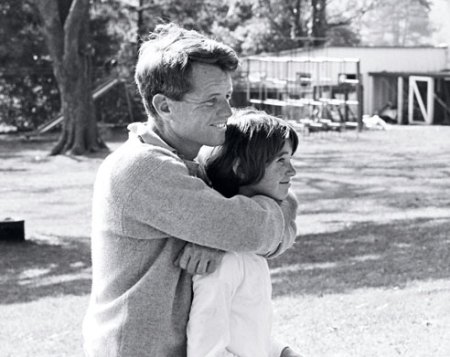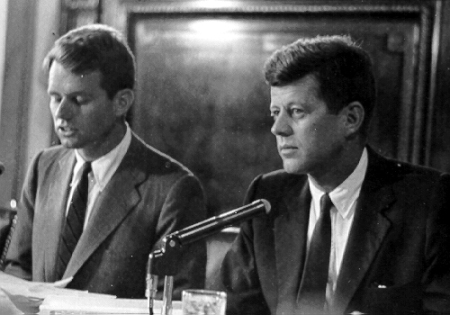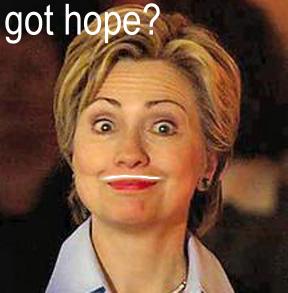HAPPY BIRTHDAY, BOB
Had he lived, Robert F. Kennedy would be 86 years old on November 20th. We thought it might be interesting to honor him this year not with a few selected quotations by him, but rather quotations about him.
How was Bobby Kennedy described by the people who knew him best?
Their opinions were not always kind, to say the least. Lyndon Johnson called Bobby “that little shitass” and “a grandstanding little runt.” (Kennedy, who cherished his very own LBJ voodoo doll, called Johnson “mean, bitter, and vicious–an animal in many ways.”)
Joe McCarthy’s chief aide (and longtime RFK nemesis) Roy Cohn referred to Robert Kennedy as a “rich bitch,” saying: “he always had that little smirk on his face, designed to get under my skin, and it did.”
Apparently the feeling was mutual, as the two men once nearly came to blows in the Senate hearing room during the Army-McCarthy hearings.
Jimmy Hoffa, who thought Kennedy “a damn spoiled jerk,” described his first meeting with him in 1957: “I can tell by how he shakes hands what kind of fellow I got. I said to myself, `Here’s a fella thinks he’s doing me a favor by talking to me.'” Hoffa later bragged that during the Rackets Committee hearings, “I used to love to bug the little bastard.”
As Bobby himself once said, we are not here “to curse the past or to praise it,” so we thought it appropriate to include the bad with the good when selecting quotes from others on what they thought of Robert Kennedy. Opinions varied, at times so wildly, you’d almost never believe that all of these people are talking about the same man.
The full truth about RFK, as ever, lies somewhere in the middle of these extremes.
I think that’s why he still fascinates us. Even after all these years, the real RFK is (to borrow from Churchill) “a riddle, wrapped in a mystery, inside an enigma,” He’s a puzzle, difficult to solve, and yet we never seem to want to stop trying.
AS THEY REMEMBER BOBBY
“The major difference between Bobby and his brothers is that Bobby always had to fight for everything.”
— Bobby’s wife, Ethel Skakel Kennedy
“He was the smallest and thinnest, and we feared he might grow up puny and girlish. We soon realized there was no chance of that.”
— Rose Fitzgerald Kennedy (mother)
“Jack is too soft and forgiving. You can trample all over him and the next day he’ll be waiting for you with open arms. But when Bobby hates you, you stay hated.”
— Joseph P. Kennedy (father)
“Bobby was the most generous little boy.”
— Jack Kennedy’s lifelong best friend, Lem Billings. (To which Joseph Kennedy Sr. gruffly replied: “I don’t know where he got that!”)
“All this business about Jack and Bobby being blood brothers has been exaggerated.”
— Bobby’s sister, Eunice Kennedy Shriver.
“Kennedy was not arrogant, but he had a sarcasm that could be biting.”
— Frank Hurley, Bobby’s classmate at Portsmouth Priory
“How would you like looking forward to that high whining voice blasting into your ear for the next six months?”
— Jack Kennedy, on hiring his younger brother Bobby to manage the 1960 campaign.
“Jack thought Bobby was too serious, a severe figure, and tried to lighten him up. At the same time, he thought Bobby was…the sacred one. He felt protective about him.”
— Chuck Spalding, longtime friend to both JFK and RFK.
“I don’t know what Bobby does, but it always seems to turn out right.”
–President-elect John F. Kennedy, shortly after winning the 1960 presidential election
“Up until the Bay of Pigs, Jack had more or less dismissed the reasons his father had given for wanting Bobby in the cabinet as more of that tribal Irish thing. But now he realized how right the old man had been. When the crunch came, family members were the only ones you could count on. Bobby was the only person he could rely on to be absolutely dedicated. Jack would never have admitted it, but from that moment on, the Kennedy presidency became a sort of collaboration between them.”
— Lem Billings, lifelong friend to the Kennedy brothers
“Everybody bitches about Bobby, and I’m getting sick and Goddamn tired of it. He’s the only one who doesn’t stick knives in my back, the only one I can count on when it comes down to it.”
— President John F. Kennedy
“You knew that, if you were in trouble, he’d always be there.”
— Former first lady Jacqueline Bouvier Kennedy Onassis on RFK
“He had a better sense of what was important, and what was not, than anyone I ever met. Once he realized something was significant, he became the most deliberate, most thoughtful, most intense man.”
— John Nolan, Kennedy’s administrative assistant at the Justice Department.
“His most tenaciously maintained secret was a tenderness so rawly exposed, so vulnerable to painful abrasion, that it could only be shielded by angry compassion to human misery, manifest itself in love and loyalty toward those close to him, or through a revelatory humor.”
— Richard Goodwin, speechwriter, longtime friend and advisor to JFK, RFK, and LBJ
“I always say—don’t try to psychoanalyze Bob. Look at what he said and look at what he did. He meant what he said, and what he did was incredible.”
— Ed Guthman, Robert Kennedy’s special assistant for public information in the Department of Justice and his first senatorial press secretary.
“I remember once John F. Kennedy talking about his younger brother. He was talking about the time when they were both a lot younger, and Bobby was small and jumping off the family sailboat. JFK said, and I quote, “It showed either a lot of guts or no sense at all, depending on how you look at it.” I think you can say that about Bobby’s entry into the 1968 presidential race. It either showed no sense at all, or a lot of guts. I think there were some of both of those factors present.”
— Ted Sorensen, policy advisor, legal counsel and speechwriter for President Kennedy.
“In every presidential election since 1968, we continue to listen for echoes of Robert Kennedy’s speeches which urged us to turn away from war, embrace peace, share the wealth and the resources of the land with the less fortunate, embrace the ideal of social justice for all, and put aside the divisions of race, age, wealth, militarism and the narrow partisanship that have come to divide us– and divide us still.I believe we will look at what he was about, what his politics and policies were about, what his motivations and commitments were about, thereby enhancing the record of his life and times for those who will come to this place to continue the quest. Today, we remember the man, who for many of us changed our lives, the man who changed the country and, had he lived, would have changed it again and again.”
— Bobby’s trusted friend and advisor John Seigenthaler
“The reason we should revive Robert Kennedy as a hero for our times, for the 21st century, is because he presents us with a flawed, complicated hero of great compassion, and leadership. His was not a leadership that sought to merely bear witness to the truth but rather one that sought results and shaped them in the anvil of action.I think that there’s nothing our politics needs today more than the image, the model, the example, and the inspiration of Robert Kennedy’s life.Throughout the Cuban Missile Crisis Robert Kennedy did what he had done as a young man. He asked moral questions: is it right or is it wrong? When I first met him, I didn’t like his answers. He was more of a Cold Warrior with a Joe McCarthy view of the world, than I was. What changed in Robert Kennedy, in my opinion, was that his view of the world became broader and deeper. The child that was compassionate, the child that was religious, the child that asked moral questions, was the man who in the Cuban Missile Crisis had the courage to ask the moral question, “Could we have a first strike and live with our conscience if we did?” In the face of the geo-politicians in that room, he asked those questions. That was not easy to do, and he did it….And then lastly, in this election right now, the clear, important message from a country divided down the middle is that we want the next President of the United States to find common ground in the way that Robert Kennedy did. He attempted to reach out to left and to right, and beyond all ideological barriers to find a common ground, to get things done.I would recommend to the next President of the United States that he immerse himself in the story of Robert Kennedy. I would say begin with Maxwell Kennedy’s beautiful book and then go on to Ed Guthman’s collection of speeches. Can we revive in our time some of what we had? …”a transcendent yearning for the possibility of redemptive change?” We all, I think, have that yearning. I think the American people have it. And the story of Robert Kennedy can drive us to try to realize that possibility.”— Harris Wofford, special assistant to President Kennedy, chair of the sub-cabinet group on civil rights.
Happy Birthday, Bobby Kennedy. This world misses you.
















